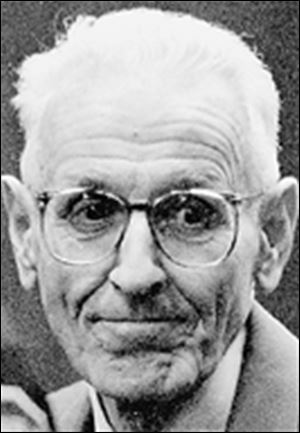
Odd man out in the Schiavo case
3/25/2005LAPEER, Mich. - There was something virtually unnoticed, but really quite odd about the debate that raged last week in courts, offices, and living rooms over the fate of Terri Schiavo, the severely brain-damaged woman whose husband removed her feeding tube in an effort to allow her to die.
What was odd was the name that was never mentioned, the little man who everybody remembers but who in this right-to-die debate wasn't there.
Jack Kevorkian.
Ten years ago, the former pathologist was among the most famous people in the nation, thanks to his crusade to make physician-assisted suicide widely accepted and legally tolerated. For a time, he actually succeeded, helping, by his count, in more than 130 suicides between 1990 and 1998.

Kevorkian
Courts refused to convict him, and after a time, prosecutors stopped charging him.
Then, in September, 1998, he moved from physician-assisted suicide to the euthanasia of a middle-aged man with Lou Gehrig's disease. He videotaped himself doing it and sent the tape to Mike Wallace, who aired it on 60 Minutes.
Wham. Kevorkian got himself convicted of second-degree murder in 1999 and was sentenced to 10 to 25 years. Today, he sits in the Thumb Correctional Facility in Lapeer. Soon after his sentencing, the Michigan Department of Corrections stopped allowing prisoners to give broadcast interviews.
And Jack Kevorkian vanished from the national consciousness. Today, he is nearly 77, and, his lawyers say, in declining health. He won't be eligible for parole for another two years, and there is no guarantee he'll get it then.
So what does he think about Terri Schiavo?
"He thinks it's outrageous that the politicians and the courts are meddling in what should be a private family and medical decision," said Dr. Stanley Levy, a friend, supporter, and Kevorkian's own physician.
Does Kevorkian support Michael Schiavo's decision to remove his wife's feeding tube? I am sure that he does. For five years, I saw him frequently and talked at length with him about every conceivable end-of-life issue.
Putting it bluntly, would Kevorkian help end Terri Schiavo's life if he could? What if Kevorkian were free and Michael Schiavo came to him and asked him to help his wife, as he has helped so many others?
Terri Schiavo, every doctor who has examined her agrees, is in a persistent vegetative state with no hope of recovery.
According to her husband, Terri was deeply affected when doctors kept her brain-dead grandmother alive despite her wishes, and made Michael vow he would never let that happen to her.
But it did, after her heart stopped in February, 1990, less than four months before Jack Kevorkian leapt out of obscurity by performing his first assisted suicide on an Oregon woman in the beginning stages of Alzheimer's Disease.
For years, Terri's husband was in denial, and sought every treatment therapy for his wife he could find. But in the end, he was forced to admit the person he had loved was gone, and only a shell remained behind.
So what would Kevorkian do?
Nothing.
The man in prison for committing euthanasia, probably for the rest of his life, would not help Terri Schiavo die. "He couldn't help her because he only helped mentally competent adults who could decide for themselves," Dr. Levy said. "He never knew her when she was mentally competent."
The husband's word wouldn't have been enough.
"He believes very firmly that there have to be safeguards."
Incidentally, last week I talked to Mike Wallace, who is still working full-time for CBS News at age 87. He is still the very model of a skeptical, hard-charging investigative journalist - and wants to get Kevorkian back on the show.
Without any doubt, Jack Kevorkian was the person who did the most to spur debate over the issue of how long medical science should prolong existence when any quality of life has long since disappeared. He is a scholar, a linguist, and an intellectual. While I haven't talked to him in years, friends tell me that he is finishing a book on the Ninth Amendment to the Constitution in his cell.
In a sense, Kevorkian is a political prisoner, who knowingly violated a law he felt unjust and risked jail for it. It is easy to understand why he is in jail.
It is much harder to understand why he should be prevented from discussing his ideas with a national audience. Almost weekly, shows like 60 Minutes have mobsters and child molesters behind bars, discussing their crimes.
But Mike Wallace told me that Gov. Jennifer Granholm won't even take his phone calls. Some in Lansing say she has her eye only on the next election, and that she fears offending the religious right. Others say she is conflicted herself, as a pro-choice Catholic. Whatever the case, just let's say that nobody is arguing that any new edition of Profiles in Courage ought to include her.